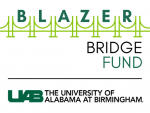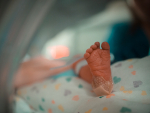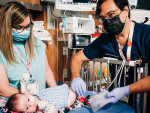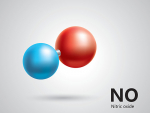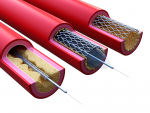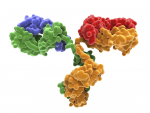Displaying items by tag: harbert institute for innovation and entrepreneurship
National conference hosted by UAB attracts entrepreneur educators from around the nation to Birmingham.
Tagged under
UAB received the IEP Innovation award, recognizing exemplary initiatives spurring innovation, entrepreneurship and technology-based economic development.
Tagged under
Tagged under
- release
- school of medicine
- office of the president
- vice president for research
- undergraduate research
- research administration
- strategic plan
- school of dentistry
- school of optometry
- school of health professions
- school of public health
- collat school of business
- school of engineering
- school of education
- college of arts and sciences
- uab medicine
- harbert institute for innovation and entrepreneurship
- school of nursing
- xenotransplantation
- xenotransplantation program
Vivek Lal, M.D., associate professor in the Department of Pediatrics at UAB Heersink School of Medicine and the founder of both ResBiotic Nutrition and Alveolus Bio, was given the 2023 Award for Excellence in Entrepreneurship.
Tagged under
- release
- harbert institute for innovation and entrepreneurship
- school of medicine
- department of pathology
- department of pediatrics
- department of urology
- department of medicine
- division of pulmonary allergy and critical care medicine
- department of biochemistry and molecular genetics
- college of arts and sciences
- department of biology
- department of chemistry
- school of engineering
This new grant will be used to develop a full-scale family of devices for inhaled nitric oxide delivery for patients with pulmonary hypertension that can be used in health care facilities and for at-home care.
Tagged under
The Blazer Bridge Fund is intended to identify and assist in the development of promising ideas, discoveries, innovations and/or technologies from UAB faculty and staff that have commercial potential.
Tagged under
- release
- harbert institute for innovation and entrepreneurship
- school of education
- school of engineering
- school of medicine
- department of otolaryngology
- department of anesthesiology and perioperative medicine
- department of microbiology
- department of medicine
- division of hematology and oncology
- division of pulmonary allergy and critical care medicine
- division of gerontology geriatrics and palliative care
IN8bio has opened a new Birmingham facility, a 10,000-square-foot advanced research and development laboratory in the Martin Biscuit Building at Pepper Place.
Tagged under
The Alabama Innovation Corporation awarded two UAB startups with grants during the second round of Innovate Alabama Supplemental Grant awards.
The panel discussion will help navigate through the daunting, complicated process of launching a startup for passionate entrepreneurs.
The grant validates the science of Alveolus Bio, and the funds will support development of first-of-its-kind inhaled biotherapeutics to treat chronic lung diseases.
Tagged under
The funded project began Jan. 1 and is expected to run for two years. The proposal focuses on developing a novel dental pulp capping material by improving bioactivity of pulp tissue while achieving ideal mechanical properties.
Tagged under
The spinoff company, IN8bio Inc., uses proprietary drug-resistant immunotherapy licensed in part from UAB. Glioblastoma is the most aggressive type of cancer originating in the brain.
Tagged under
Experimental neonatal chronic lung disease is marked by a redox imbalance that damages the lungs, and that damage can be ameliorated using a live biotherapeutic mixture of three Lactobacillus species.
Tagged under
At their annual Innovation Awards, UAB’s Bill L. Harbert Institute for Innovation and Entrepreneurship celebrated innovators from all corners of campus for their accomplishments, inventions and ingenuity.
Tagged under
- release
- college of arts and sciences
- school of engineering
- school of medicine
- department of medicine
- uab medicine
- collat school of business
- barefield entrepreneurship program
- department of physics
- department of pediatrics
- department of dermatology
- division of pulmonary allergy and critical care medicine
- comprehensive diabetes center
- department of materials science and engineering
- department of computer science
- department of ophthalmology and visual sciences
- department of mechanical engineering
- department of microbiology
- division of gerontology geriatrics and palliative care
- harbert institute for innovation and entrepreneurship
The Zorro-Flow Inc. is the newest startup from the UAB Harbert Institute for Innovation and Entrepreneurship. The device is the first external catheter to collect urine effectively, safely and comfortably from critically ill female neonates and children.
Tagged under
Thaddaeus Kwan, Ph.D., became one the first Innovate fellows in the Harbert Institute for Innovation and Entrepreneurship while a postdoc at UAB. He now works in HIIE as a project analyst — and heads the Fellows program.
All of the newly diagnosed glioblastoma multiforme patients enrolled in a Phase 1 clinical trial have exceeded both their median and expected progression-free survivals. Two patients, to date, have exceeded their expected overall survival.
Tagged under
This therapy, using sustained release of nitric oxide, may be a novel, efficient and safe way to prevent and treat multiple metabolic diseases.
Tagged under
- release
- school of medicine
- school of engineering
- department of medicine
- department of biomedical engineering
- department of neurobiology
- division of endocrinology diabetes and metabolism
- division of cardiovascular disease
- harbert institute for innovation and entrepreneurship
- comprehensive diabetes center
Researchers have been awarded a $2.6 million, four-year National Institutes of Health grant to evaluate a safer and more durable stent design, using techniques licensed through the UAB Harbert Institute for Innovation and Entrepreneurship by the UAB spinoff company Endomimetics LLC.
Tagged under
The monoclonal antibody cocktail is deliverable via a nasal dose, and it is also effective against SARS, MERS and several coronavirus cold viruses. The antibodies are engineered for long-acting effectiveness, potentially lasting a year or more when used in humans.
Tagged under





